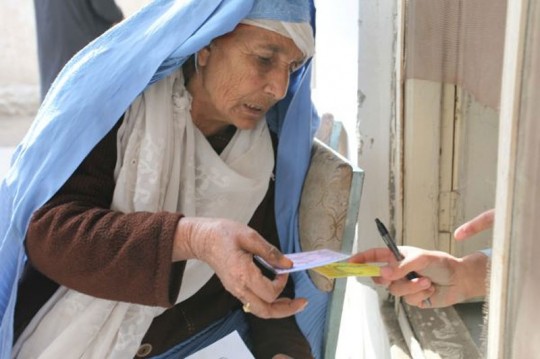UN food agency launches initiative to fight hunger in Afghan cities
UN food agency launches initiative to fight hunger in Afghan cities

The United Nations World Food Programme (WFP) announced today a new food subsidy initiative geared towards providing Afghanistan’s urban poor with guaranteed access to provisions despite the threat of food insecurity across the country.
The project, coordinated in partnership with the Afghan Ministry of Labour, Social Affairs, Martyrs, and Disabled (MoLSAMD), is designed to assist households in Kabul through a monthly cash voucher programme aimed at offsetting the impact high food prices have on the city’s poor.
‚ÄúWe are launching this project after the successful implementation of similar programmes in other Afghan cities where it has had a positive impact on household food security,‚Äù¬Ýsaid¬ÝBradley Guerrant, WFP‚Äôs Deputy Country Director for Afghanistan, referring to similar voucher programmes in other Afghan cities, including Mazar-i-Sharif, Herat, and Jalalabad.
We are launching this project after the successful implementation of similar programmes in other Afghan cities where it has had a positive impact on household food security.
“We are very happy to be working in partnership with MolSAMD to help contain the impact of high food prices on the Afghan urban poor,” he added.
According to WFP, some 18,000 households – or an estimated 114,000 individuals – consisting mainly of poor women and households headed by people with disabilities will benefit from the project. Each monthly voucher is worth $25 and can be exchanged for food items in participating local shops.
While most of WFP’s work has traditionally focused on food-insecure rural areas of Afghanistan, the new voucher project, to which the UN agency will contribute $3 million over a six-month period, will function as a safety net for those urban poor who are particularly vulnerable to high food prices.
###
About United Nations World Food Programme (WFP)
Fighting hunger worldwide

The World Food Programme is the world’s largest humanitarian agency fighting hunger worldwide.
“In¬Ýemergencies, we get food to where it is needed, saving the lives of victims of war, civil conflict and natural disasters. After the cause of an¬Ýemergency has passed, we use food to help communities rebuild their shattered lives.”
WFP is part of the United Nations system and is voluntarily funded.
Born in 1961, WFP pursues a vision of the world in which every man, woman and child has access at all times to the food needed for an active and healthy life. We work towards that vision with our sister UN agencies in Rome — the Food and Agriculture Organization (FAO) and the International Fund for Agricultural Development (IFAD) — as well as other government, UN and NGO partners.
In 2011 we aim to reach more than 90 million people with food assistance in more than 70 countries. Around 10,000 people work for the organization, most of them in remote areas, directly serving the hungry poor.
WFP’s five objectives:
- Save lives and protect livelihoods in emergencies
- Prepare for emergencies
- Restore and rebuild lives after emergencies
- Reduce chronic hunger and undernutrition everywhere
- Strengthen the capacity of countries to reduce hunger
WFP’s¬ÝMission statement
WFP is the food aid arm of the United Nations system. Food aid is one of the many instruments that can help to promote food security, which is defined as access of all people at all times to the food needed for an active and healthy life.¬Ý¬π The policies governing the use of World Food Programme food aid must be oriented towards the objective of eradicating hunger and poverty. The ultimate objective of food aid should be the elimination of the need for food aid.
Targeted interventions are needed to help to improve the lives of the poorest people – people who, either permanently or during crisis periods, are unable to produce enough food or do not have the resources to otherwise obtain the food that they and their households require for active and healthy lives.
Consistent with its mandate, which also reflects the principle of universality, WFP will continue to:
- use food aid to support economic and social development;
- meet refugee and other emergency food needs, and the associated logistics support; and
- promote world food security in accordance with the recommendations of the United Nations and FAO.
The core policies and strategies that govern WFP activities are to provide food aid:
- to save lives in refugee and other emergency situations;
- to improve the nutrition and quality of life of the most vulnerable people at critical times in their lives; and
- to help build assets and promote the self-reliance of poor people and communities, particularly through labour-intensive works programmes.
###
> United Nations (UN).
 The United Nations was established on 24 October 1945 by 51 countries committed to preserving peace through international cooperation and collective security. Today, nearly every nation in the world belongs to the UN: membership totals 192 countries.
The United Nations was established on 24 October 1945 by 51 countries committed to preserving peace through international cooperation and collective security. Today, nearly every nation in the world belongs to the UN: membership totals 192 countries.
When States become Members of the United Nations, they agree to accept the obligations of the UN Charter, an international treaty that sets out basic principles of international relations. According to the Charter, the UN has four purposes:
- to maintain international peace and security;
- to develop friendly relations among nations;
- to cooperate in solving international problems and in promoting respect for human rights;
- and to be a centre for harmonizing the actions of nations.
###
* The above story is adapted from materials provided by¬ÝUnited Nations (UN)
** More information at¬ÝUnited Nations (UN)





















